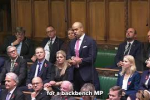The original article was published on The Times Red Box on 10th January 2020 (Link Below):
House Negro. Token. Sellout: words that, until recently, I hadn’t heard directed at me in my adult life. Following a decade in the British Army my tolerance for offence is set fairly high, but this was different. That the worst abuse I’ve experienced came exclusively from the black community is as shocking as it is disappointing.
As the Conservative Prospective Parliamentary Candidate for Hackney North and Stoke Newington in the general election I had hoped to have a positive impact. One my goals was to move the needle on a specific part of the conversation, i.e. by being a positive black male role model who wasn’t a sportsman or a musician.
The 36-hour Twitter pile-on I unwittingly unleashed began when I shared a tweet by writer Marianne Miles. She had spoken to many black families who were contemplating leaving the UK in the event of a “racist” Conservative win. I expressed my disappointment at this and said that I wouldn’t be standing for election as a Tory if I believed the party was racist.
I was quickly informed that I was a stooge, a ‘beard’ for the institutionalised racism that had manifested itself in the government’s perceived ill-treatment of the black community. These accusations, though from a vitriolic and anonymous minority, included contributors to The Guardian and BBC R5 Live. A former BBC Radio presenter who works in communications for Race On The Agenda and The Runnymede Trust, compared me to a “house negro”. These are people with a platform and a responsibility to maintain the standard of discourse.
So where does the opprobrium stem from?
Black communities are over-represented in lower socio-economic groups, concentrated in urban areas and more likely to face food insecurity or lower wages. This is coupled with a media echo chamber that reinforces the perception that there is institutional hostility. Fifteen-year-old comments and articles are dredged up as evidence of this, playing to the gallery with references to imperialism and colonialism. It seeks to divide and regress rather than unify and move forward, and it fosters a them-and-us narrative which tells black Britons that they are second-class citizens. It only ever seeks to frame success in the arenas of music or sport, where we are entertainers and jesters rather than politicians or leaders.
The black population is often viewed as a homogenous group whose opinions, ambitions, desires and concerns align rather than contrast. We would do well to recognise that this perception, reinforced by depictions in the media, both positive and negative, reduces us to a clichéd stereotype. Those who fall outside the “acceptable portrayal” of blackness are more likely to face criticism from those who identify themselves as the “right” sort of black Briton, who have the “right” sort of partners, listen to the “right” sort of music or hold the “right” sort of politic views.
There is an episode of 90s sitcom The Fresh Prince of Bel-Air that summarises the situation most eloquently. The preppy, bookish Carlton defends himself in the face of accusations that he does not represent the right type of blackness:
“Black isn’t what I’m trying to be, it’s what I am. I’m running the same race and jumping the same hurdles that you are, so why are you trying to trip me up? If you ask me, you’re the real sellout.”
Ben Obese-Jecty was the Conservative candidate in Hackney North and Stoke Newington




